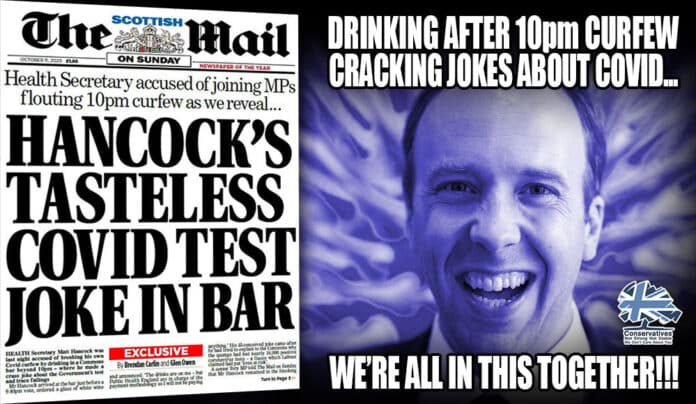Matt Hancock made a number of claims during the course of his evidence to the science and health joint committee which have subsequently been questioned by MPs and some scientists.
On issues such as the supplies of PPE, the rationing of care, and asymptomatic transmission, the health secretary’s account was repeatedly challenged.
Here are some of the areas where Mr Hancock’s statements came in for close scrutiny.
PPE supplies
The health secretary claimed that while there were “local issues” around the provision of PPE last spring, there was “never a national shortage”.
Labour’s Sarah Owen suggested this claim was impossible to reconcile with the images of health workers using bin bags for aprons widely circulated on social media at the time.
Matt Hancock pointed to the National Audit Office report from last November to support his assertion, citing this passage directly: “The NHS provider organisations we spoke to told us that, while they were concerned about the low stocks of PPE, they were always able to get what they needed in time.”
However, Mr Hancock did not make clear that the following paragraph says: “This was not the experience reported by many front-line workers. Feedback from care workers, doctors and nurses show that significant numbers of them considered that they were not adequately protected during the height of the first wave of the pandemic.”
It goes on to say: “From this survey evidence we cannot know how representative these experiences are of the whole workforce, but occurrence of shortages is supported by other qualitative evidence.”
A report by the Public Accounts Committee published in February came to a similar conclusion: “Many workers at the front line in health and social care were put in the appalling situation of having to care for people with COVID-19 or suspected COVID-19 without sufficient PPE to protect themselves from infection.”
Rationing of treatment
Matt Hancock was firm that at no point in the pandemic had the NHS been unable to provide medical care – “availability of treatment was always there”, he told the committee.
But in his response to further interrogation from Labour’s Barbara Keeley, it became clear the health secretary was making a more subtle point – not that denial of treatment did not happen, instead that it was never something which was endorsed.
In response to examples Barbara Keeley put forward of “do not resuscitate” (DNR) orders being used and hospitals refusing COVID-positive admissions from care homes, Mr Hancock said the “clinical advice” from government medical officials had never recommended such triage and that guidance was issued to prevent the use of DNR orders.
Asymptomatic transmission
The health secretary also described how he “bitterly” regrets not ignoring advice from the World Health Organisation (WHO) that asymptomatic transmission of COVID-19 was unlikely.
Mr Hancock claimed he had been told by the WHO that references to asymptomatic transmission in reports from China in January 2020 were “likely mistranslation”.
Since last summer, Matt Hancock and Boris Johnson have both regularly pointed to the lack of understanding around asymptomatic transmission as an explanation for why so many deaths occurred in care homes.
This defence, however, has long been disputed by scientists.
Minutes from the meeting of the government’s Scientific Advisory Group on Emergencies (SAGE) from 28 January 2020 say: “There is limited evidence of asymptomatic transmission, but early indications imply some is occurring. PHE developing a paper on this.”
SAGE minutes from 4 February 2020 show ministers were told: “Asymptomatic transmission cannot be ruled out and transmission from mildly symptomatic individuals is likely.”
At the SAGE meeting on 30 April 2020, it was noted that an NHS study indicated the positive test rate among asymptomatic healthcare workers was around 5-6%.
Lockdown delayed due to ‘fatigue’ concerns
Another argument put forward by Matt Hancock was that locking down earlier last spring would have gone against the scientific consensus at the time.
“The clear advice at the time was that there’s only a limited period that people would put up with it…would put up with lockdown…now that proved actually to be wrong,” he said.
Mr Hancock insisted he had scrutinised the advice, but “ultimately we didn’t know how long people would put up with it and now it seems obvious that people will put up with lockdowns – it was not at all obvious”.
Professor John Drury, who is a member of the SPI-B group of government advisers who focus on such issues, has rejected this narrative.
“As the SPI-B document from March last year indicates, there was not a ‘consensus’ among scientists that the public would not ‘put up with’ the restrictions,” he says. “The restrictions we were asked about in this briefing document were to do with reducing social contacts (i.e. physical distancing), not ‘lockdown’.”
However, it is wrong to say the issue was not raised at all by government advisers.
At a Downing Street briefing on 9 March 2020, the chief medical officer, Professor Chris Whitty, said: “It is not just a matter of what you do but when you do it. Anything we do, we have got to be able to sustain.
“Once we have started these things we have to continue them through the peak, and there is a risk that, if we go too early, people will understandably get fatigued and it will be difficult to sustain this over time.”
PLEASE SUPPORT US FOR JUST £2 A MONTH







